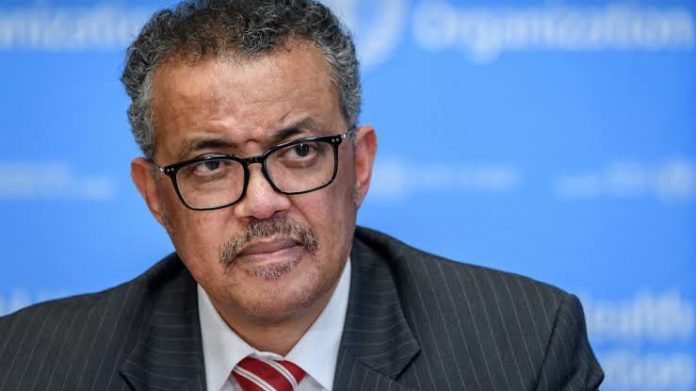New Delhi (NVI): WHO chief Tedros Adhanom Ghebreyesus has backed the proposal by India, South Africa and 10 other developing countries to issue a temporary waiver to patents on medical products for COVID-19 until the end of the pandemic, to benefit poor nations.
Addressing Finance Ministers at the ‘Financing COVID19 Vaccines for Africa’ meeting yesterday, the WHO DG thanked South Africa and India for their proposal to the World Trade Organization (WTO) to waive patents on medical products for COVID-19 until the end of the pandemic.
“We encourage other African countries to support this initiative. The flexibilities in the TRIPS agreement are there to be used in emergencies. If not now, then when? We also urge you as finance ministers to invest in local production of vaccines, not only for the pandemic but for other vaccines that all countries need for routine immunization programmes,” he said.
“We need equal access to life-saving tools everywhere, if we are to end the #COVID19 pandemic. If a temporary waiver to patents cannot be issued now, during these unprecedented times, when will be the right time? Solidarity is the only way out,” the WHO chief said in a tweet.
He also said that one of the main priorities for WHO now is to increase the ambition of COVAX to help all countries end the pandemic by scaling up manufacturing. “This means urgent action to scale up manufacturing to achieve a rapid increase in the volumes of doses,” he said.
COVAX, known as the COVID-19 Vaccines Global Access Facility, is a global initiative aimed at equitable access to COVID-19 vaccines to middle and lower-income countries. The initiative is led by Gavi, the Vaccine Alliance, the World Health Organization, the Coalition for Epidemic Preparedness Innovations, and others.
“We are working with our partners to find ways to increase production, including technology transfer, voluntary licensing and other mechanisms to address production bottlenecks,” he added.
Tedros said that WHO is committed to fostering a closer working relationship between COVAX and AVATT to leverage their combined strength to ensure the rapid scale-up and distribution of all the vaccines it needs to stop the pandemic across the continent.
“So far, almost 4 million cases have been reported from African Union countries, and we have lost more than 100 thousand of our brothers and sisters. We know that the real numbers are higher,” he said.
The WHO chief further said that the pandemic has presented a surprising paradox. “Some of the wealthiest countries, with the most advanced medical technology, have been hardest hit, while many countries in Africa have managed to prevent or control widespread community transmission,” he said.
This is thanks in part to African countries’ long experience in applying basic public health tools to prevent and respond to outbreaks of infectious disease, he added.
“But we also know that our continent’s relatively young population means Africa has not seen the same scale of severe disease and death as other regions with older populations,” he said.
Tedros informed that this week, Ghana and Côte d’Ivoire became the first countries to start vaccination with doses allocated through COVAX.
“Between now and the end of May, 237 million doses of vaccines will be allocated to 142 participating economies and countries in COVAX,” he said.
“We are committed to fostering a closer working relationship between COVAX and AVATT to leverage their combined strength to ensure the rapid scale-up and distribution of all the vaccines we need to stop the pandemic across the continent,” he said at the meeting.
-ARK








